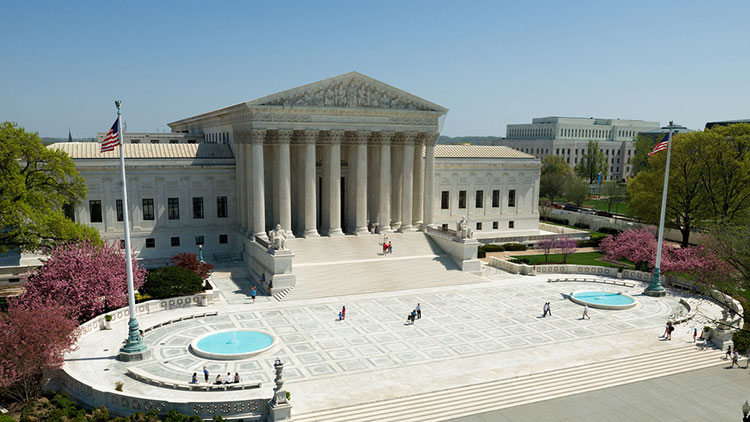House Subcommittee Mulls Cameras in Court

The smarter way to stay on top of broadcasting and cable industry. Sign up below
You are now subscribed
Your newsletter sign-up was successful
Rep. Jerrold Nadler (D-N.Y.) pointed out that between online streaming on YouTube and Facebook and cable net simulcasts, an audience of more than a million heard the arguments on a federal court's rejection of President Donald Trump's temporary immigration ban executive order—the arguments were via conference call so there was no video.
He suggested that access to the arguments "without any news filter, helped people judge the validity of the President's assertions about the integrity of those proceedings."
That came in a hearing in the House Courts, Intellectual Property and the Internet Subcommittee Tuesday. The Hill hearing came against the backdrop of President Donald Trump's attacks on the judiciary, regarding the Ninth Circuit's executive order decision in particular, as politicized, broken and "disgraceful"—a backdrop Nadler pointed to, calling the attacks on the legitimacy of the judicial branch from the oval office unprecedented. That concern was echoed by Rep. John Conyers (D-Mich.) and others.
Mickey Osterreicher, general counsel of the National Press Photographers Association, agreed with Nadler, saying it was critical in an age of alternate facts and fake news accusations—the latter a popular slam from the President on stories he doesn't like—"that the people have the opportunity to see and hear for themselves how the government is conducted in all three branches." He called it a "much more direct form of Democracy," even suggesting it should appeal to a constitutional originalist. He said people could see and hear for themselves, "just as our framers envisioned" at a time when people could drop in to court in person.
Nadler, who has proposed legislation to bring cameras into the Supreme Court and other federal courts, said one of the criticisms is that judges and lawyers would play to the cameras. Osterreicher said he was not aware of evidence that happened during tests of cameras in courts.
Osterreicher also said he was not aware of any allegations that cameras had affected an outcome.
The three witnesses at the hearing were asked whether they supported cameras in court for anything other than appellate court arguments. Indiana Law School Professor Charles Geyh said he supports it in appellate argument and in limited use in trials. Osterreicher seconded that. Cornell Law Professor Thomas Bruce went further, saying he supported them in all aspects of the judicial process. Osterreicher noted one case, in 1981, where cameras had been alleged to have impacted an outcome, but said they were still "absolutely crucial" to judiciary transparency.
The smarter way to stay on top of broadcasting and cable industry. Sign up below
Rep. Ted Poe (R-Texas), a former trial judge and one of the first in the state to allow cameras in his court, said his was a very structured and discreet system. He said opponents had argued that the world would end if cameras were put in the court. They were, and it didn't. "It worked and it was great not just for the public but law students to see those cases tried from gavel to gavel." He said he was a great fan "because we have the greatest judicial system in the world," a tone the current Republican President has notably not taken with the courts.
Poe said the Ninth Circuit case was a perfect example of when cameras would let the public see for themselves without relying on soundbites.
Poe said it was preferable to a 90-second news soundbite about what some reporter thinks took place in the courtroom. He said it was shameful that the public could not see the proceedings for themselves.
One of the late Justice Antonin Scalia's issues with allowing cameras was that the footage would be chopped up, taken out of context, and turned into such 'bites."
Poe said he had rules in his court about not showing children or sexual assault victims, and that the media always respected those. "We never had a problem with it," he said, though he added they realized they could be jailed for doing so.
Subcommittee chairman Darrell Issa (R-Calif.) vowed that the subcommittee would conduct vigorous oversight of the courts.
“Though trust in government is at an all-time low, there are numerous immediate steps the judiciary could undertake to demonstrate that it’s fulfilling its constitutional mandate with integrity,” said Fix the Court executive director Gabe Roth, a longtime advocate for greater transparency in general and audio and video in the courts in particular. “Since the third branch has declined invitations to open up on its own, Congress is well within its powers to pass basic reforms that would increase the judicial transparency and accountability, and I’m pleased so many were highlighted in the hearing in such a bipartisan way.”
Contributing editor John Eggerton has been an editor and/or writer on media regulation, legislation and policy for over four decades, including covering the FCC, FTC, Congress, the major media trade associations, and the federal courts. In addition to Multichannel News and Broadcasting + Cable, his work has appeared in Radio World, TV Technology, TV Fax, This Week in Consumer Electronics, Variety and the Encyclopedia Britannica.

